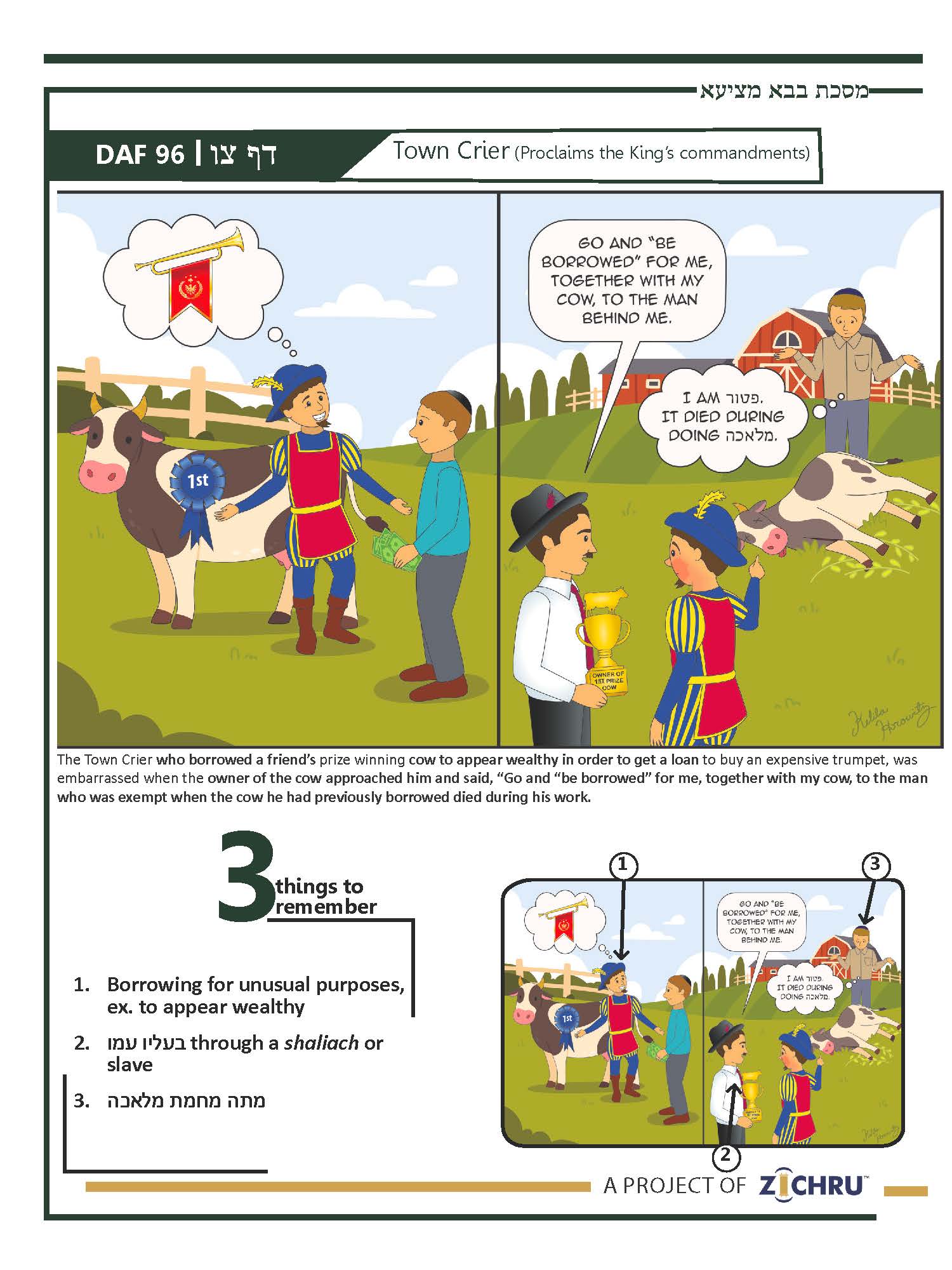Bava Metzia - Daf 96
- Audio Timestamps
0:00 - The 3 Sugyos
2:53 - Review of 3 Sugyos
5:32 - Siman
8:05 - 4 Blatt Back Chazarah
15:55 - Pop Quiz (Last 7 blatt)
For access to all Zichru resources including PDFs, and illustrations CLICK HERE
- Borrowing for unusual purposes, or for less than a perutah’s value
Rami bar Chama asked a series of questions, which Rashi explains to be about a borrower’s liability: (1) שאלה לרבעה – if he borrowed [an animal] to sodomize it, is he liable for אונסין? Do we say: כדשיילי אינשי בעינן – we require a loan like people normally borrow, but this unusual loan would not be liable for אונסין, or is a שואל’s liability משום הנאה – because of the benefit derived from the loan, which would apply here as well? (2) שאלה ליראות בה – If he borrowed it to appear wealthy through it (so people extend him credit), is he liable as a שואל? Do we say ממונא בעינן – we merely require borrowing [something of] value, which is satisfied here, or must he also benefit from the borrowed item (but here, he does not benefit from using the animal itself)? (3) If he borrowed it for a benefit worth less than a perutah, is he liable as a שואל, because he borrowed an item of value and benefited from it, or is less than a perutah’s value halachically insignificant? (4) If a perutah’s value is required, what if he borrowed two cows for a total benefit of a perutah?
- בעליו עמו through a shaliach or slave
Ravina asked Rav Ashi: האומר לשלוחו צא והשאל לי עם פרתי – if one says, “Go and ‘be borrowed’ for me together with my cow,” i.e., he instructed him to service the borrower of his cow on his behalf, does this qualify for the exemption of בעליו עמו? Do we require בעליו ממש – the literal owner, which this shaliach is not, or do we apply the principle that שלוחו של אדם כמותו – a person’s shaliach is legally like himself? He was told this is a machlokes, where someone appointed a shaliach to revoke his wife’s nedarim while he is away, where Rebbe Yoshiyah says the shaliach cannot fulfill the husband’s role, and Rebbe Yonasan says he can. Rav Ilish asked Rava about one who tells his עבד כנעני to enter service for the borrower of his animal. The Gemara explains that the question is relevant according to both opinions about shelichus: even if a shaliach can be a substitute for the owner, that may be דבר מצוה הוא – because he is subject to all mitzvos, whereas an עבד כנעני is exempt from some mitzvos (like a woman). Even if a shaliach cannot substitute the owner, perhaps a slave can, because: יד עבד כיד רבו דמיא – a slave’s hand is like his master’s hand. Rava affirmed this final reasoning.
- מתה מחמת מלאכה
A question was asked: כחש בשר מחמת מלאכה מאי – if [a borrowed animal] was weakened because of work performed for the borrower, what is the halachah? Is the borrower liable, like for any mishap? Rav Chilkiyah the son of Rav Avya responded that the question implied that if the animal died from working for the borrower, the borrower would be liable. To this, he objected that the borrower can say: לאו לאוקמא בכילתא שאילתה – I did not borrow it to keep it in an enclosure, but to use it! Rava agreed and ruled that not only where the animal was weakened from work, but even מתה מחמת מלאכה – if it died because of work performed for the borrower, he is exempt, because he can say he did not borrow it to keep in an enclosure, but to use it, and the lender gave him permission to do so. Someone once borrowed an axe, and it broke during use. Rava told him to bring witnesses that he did not deviate from the intended work, and he would be exempt.
Siman – Town Crier (Proclaims the King’s commandments)
The Town Crier who borrowed a friend’s prize-winning cow to appear wealthy in order to get a loan to buy an expensive trumpet, was embarrassed when the owner of the cow approached him and said, “Go and “be borrowed” for me, together with my cow, to the man who was exempt when the cow he had previously borrowed died during his work.


